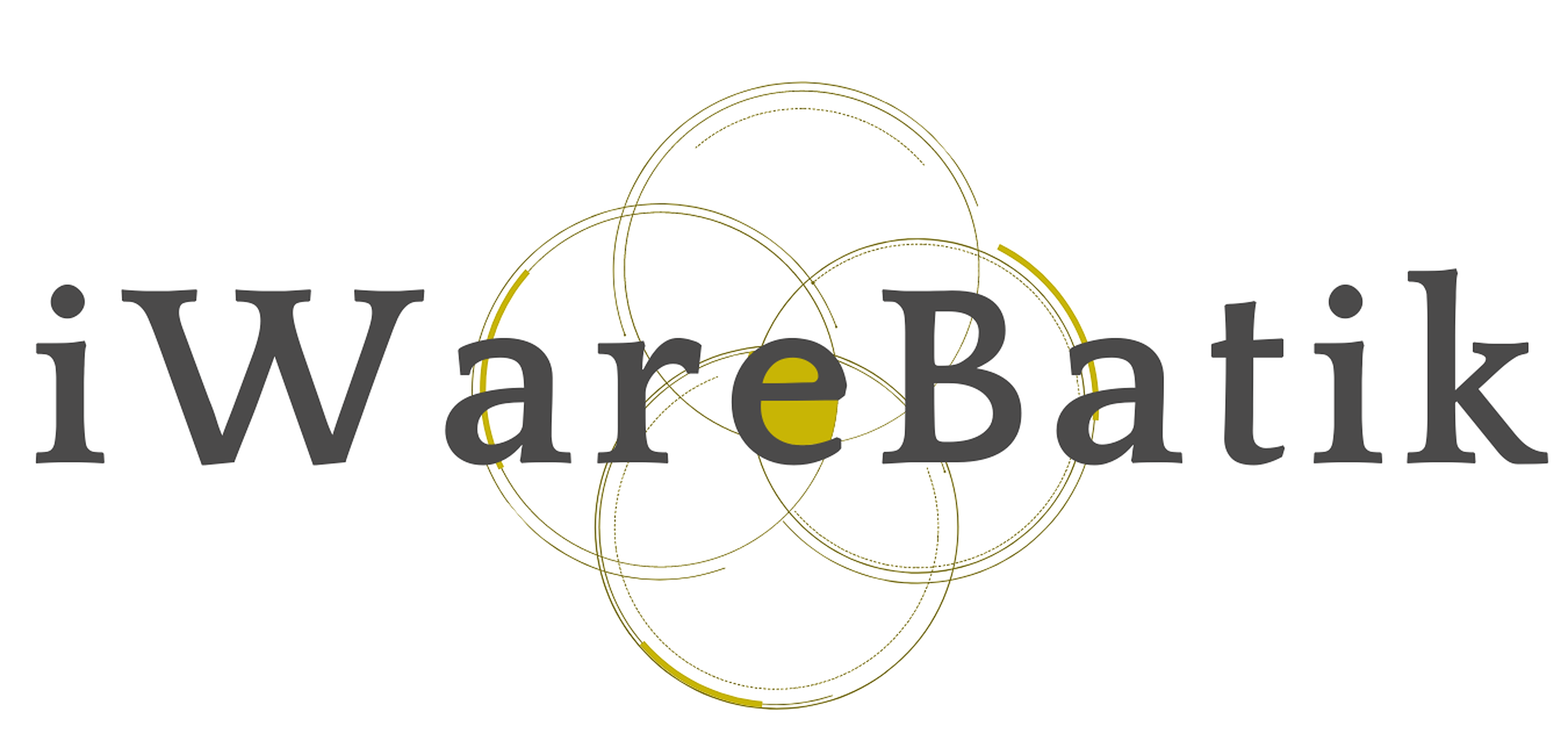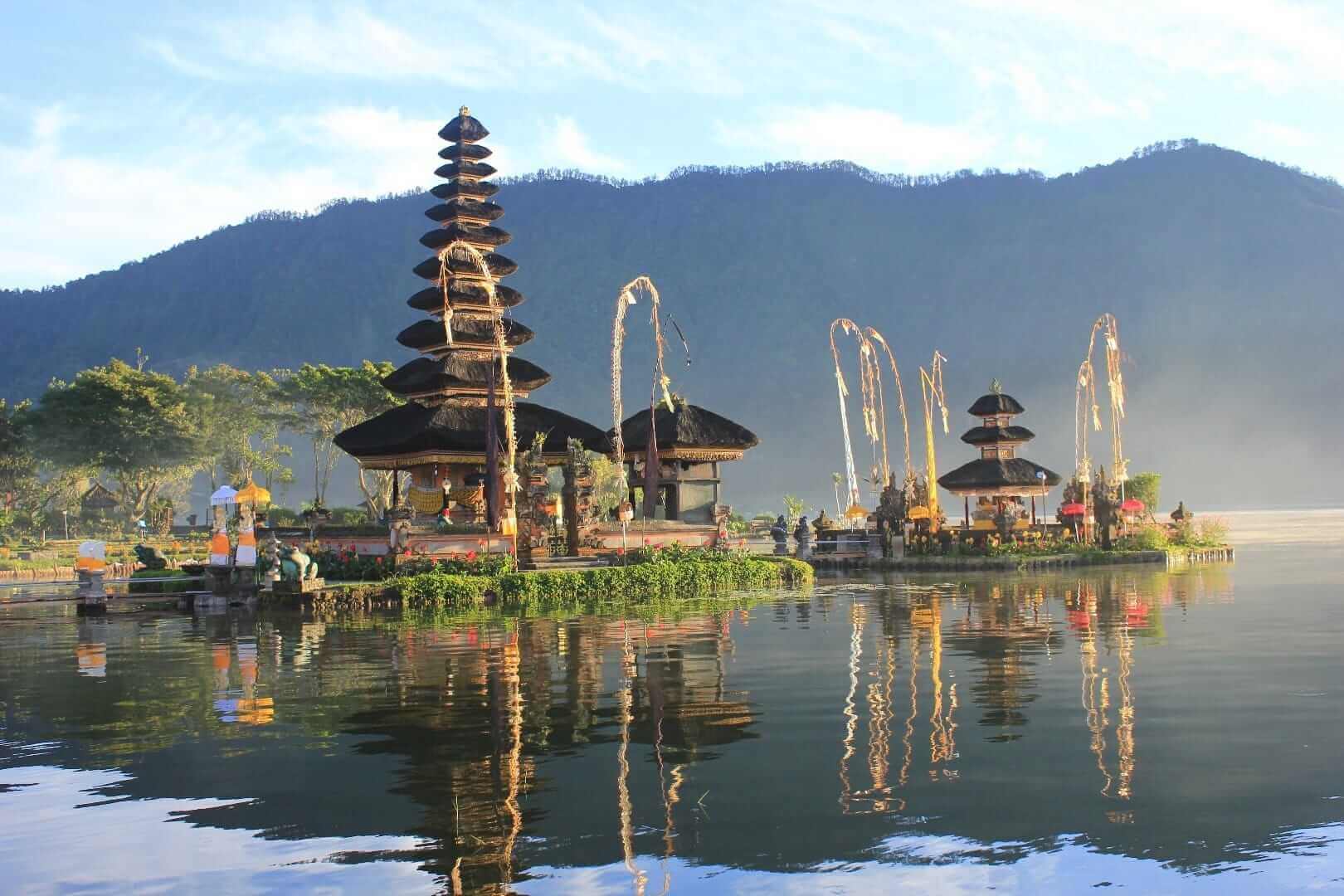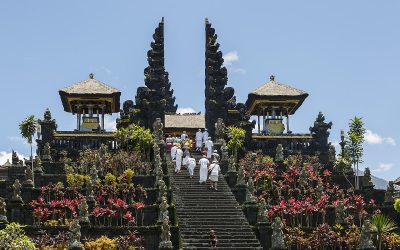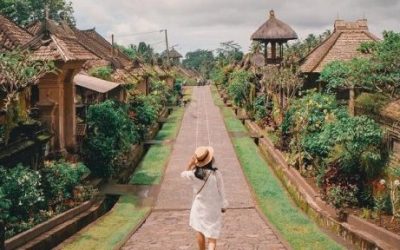Home / Batik Regions – Central Indonesia – Bali / Bedugul – Ulun Danu Beratan Temple
Cultural Destination
Embrace the spirit of the place!
Ulun Danu Beratan Temple in Bedugul
Bedugul, the site of the Ulun Danu Beratan water temple, is an excellent place for having a peaceful retreat or spiritual soul discovery. From its location on the high plateau right in the centre of the island, it commands a great view of the subak irrigation of Bali. You can walk around the lakes, surrounding hills, and visit the water temple to join the water purifying rituals. It is a magic place with cool air, mists, and the fragrance of flowers.
Tourist Attractions in Bali
Besakih Temple
Besakih Temple is regarded as Bali’s ‘Mother temple’ – a grand
Penglipuran Village
Penglipuran Village is awarded as the 3rd most beautiful and cleanest village in the world
Tanah Lot
Tanah Lot Temple is one of Bali’s most important landmarks, where
Bali
Batik Motifs
Merak Abyorhokokai
The peacock batik motif depicts the bird’s beauty as the focal point of
Buketan Bali
The Balinese bouquet (Buketan Bali) is a floral arrangement and the name is
Discover
Indonesian
Batik
Motifs
Bekantan Pakis
This motif represents Pakis Haji (Polystichum setiferum), an endemic plant in
Raja Ampat
Raja Ampat motif represents the marine life at Raja Ampat archipelago in
Pati-Pati Pinehiku
It symbolizes the hierarchy in society and the social status of the Mekongga
Tifa Totobuang
The batik motifs illustrate Maluku’s traditional music instrument called
Malinau Cultural Festival
You will witness a unique competition that might not be found other than in
Pucuk Rebung Riau
Pucuk Rebung symbolizes heart determination in achieving goals, good luck, and
Kuda Kupang
Horses symbolize wealth. It contains noble values of virtuous characters that bring
Kawung
The Kawung motif was created by Sultan Agung Hanyokrokusumo (1593 – 1645) as a symbolic gift for
Kain Cual
Cual textile tradition has existed since the 17th century. The word “Cual” refers to
Angsa Duo
According to legend, the Angso duo batik motif is a pair of swans that are believed to have led Princess
Sekomandi
Its philosophical meaning is the eternal union which refers to a saying “until death do us part”
Tenun Bima
The motifs are adopted from Bima woven textile. This pattern has received a great
Ake Patra
Ake is related to the divinity and the composition of the universe. It is a symbol of
Sido Mulyo
Sidomulyo is one of the classical motifs, which is specifically used for the bride’s costume in
Rangkiang
The word “Rangkiang” refers to the rice granary in the Minangkabau language. It symbolizes
Jupri Kembang Teh
Kembang Teh illustrates the tendrils of tea plants that grow in the highlands of
Kaharingan
The Kaharingan or ‘tree of life’ based on the Dayak tribes’ belief system. This tree symbolizes
Hiu Taliyasan
Indonesia is also home to the world’s largest fish, the whale shark (Rhincodon typus). Hiu Taliyasan refers to
Durian Pecah
Broken Durian motifs depict the foundation of faith. The second half signifies the mastery of
Parang Seling
Parang Seling or “alternating daggers” is a royal batik motif. It is a feminine variant of
Besurek Rafflesia
The term “Basurek” refers to a textile that contains letters or inscriptions
Parang Rusak
Another meaning behind this motif is an unconquerable spirit, symbolized by
Cengkeh
The clove flower motif is the main commodity of the Tolitoli Regency. This motif represents
Lipaq Sabe
Lipaq Saqbe contains a simple geometric classical motif with various flower decorations. This textile is
Teguh Bersatu
This batik motif shows the strength of the people of Kupang. It also represents a sense of
Gonggong Siput
Gonggong (Strombus Turturella) is one type of sea snail found around
Singayaksa
The Singayaksa motif comes from the name of a place where Sultan Hasanuddin used to
Sekar Jati
Sekar means flower and Jati refers to teak trees that symbolizes a strong mental character that
Bintik Tujuh
The Bintik Tujuh (Seven Dots) motif has 7 white spots and green color gradation as
Tikar Natuna
The Tikar Natuna motif is adapted from the traditional making of pandanus mats in
Tanah Liek
The word “Tanah Liek” refers to clay in Minang language. It is also known as
Sero Tangga
The Sero Tangga illustrates an endearing feeling and sacrifices of a person to fulfil
Daun Sirih
This motif illustrates betel leaves that are used by Lombok communities as traditional
Sandeq
Sandeq Boat is a symbol of the maritime importance of the West Sulawesi region. The greatness of
Insang Ikan
Insang refers to the gills of the fish. This is a typical pattern of Malay ethnic who inhabits
Kaganga Tanah Rejang
If Batik Besurek combines Arabic calligraphy motifs, then the Kaganga batik takes
Mahkota Siger
Siger is the crown of a noblewoman in ancient time. It is a symbol of femininity, strength, and
Bultiya
The word ‘Bultiya’ is an acronym of the three major tribes in North Kalimantan, namely
Honai
The Honai is inspired by the traditional house of the Papuan community living in
Gurdo Solo
Gurdo or garuda bird is the mount of the Indian god Vishnu. As the Sun Bird,
Lok Baintan Floating Market
As you can imagine, the most authentic thing is that you can buy things and even
Tangerang Herang
Tangerang Herang motif is a symbol of Tangerang city. The Tangerang Herang batik motif consists of
Pohon Hayat (Tree of Life)
The Batik motifs in Lampung are dominated by the acculturation of Buddhist and
Ukir Sentani
The Ukir motif is a batik motif that is inspired by various traditional Sentani wood carvings
Buketan Bali
The Balinese bouquet (Buketan Bali) is a floral arrangement and the name is
Bale Lumbu
This motif signifies the welfare of the ancient Sasak society. Bale also symbolizes the
Rumah Mamuju
the Batik motif illustrates the house of Mamuju King with the stairs, located on the left of the wooden stage house
Daun Lada Hitam
The black pepper motif represents the main commodity of Bangka Belitung
Manguni Minahasa
Manguni is identified as the symbol of the Minahasa people. Manguni is known as a
Karawo Pinang
Pinang refers to the Palm areca tree. This motif is considered as the original
Enggang Dayak
Local people beliefs that hornbills are an incarnation of the Commander of the Birds. It has supernatural
Gumin Tambun
Based on Hindu mythology, this motif symbolizes lucks, abundant wealth, and
Merak Ngeram
The hatching peacock motif has a very deep meaning which refers to the sacrifice and
Biji Kopi
The coffee seeds motif illustrates the pride of local coffee specialities in
Pattimura
Pattimura is the name of an Indonesian hero who fought against colonialism in
Wakatobi
It symbolizes the coastal beauty of the Wakatobi island and the symbol of Patra symbolizes
Pinawetengan
The Pinawetengan Batik pattern was taken from a prehistoric inscription in
Daun Simpor
This motif is inspired by the Simpor plant (Dillenia Suffruticosa) which is a typical
Srimanganti
The name of the Srimanganti motif is derived from Palace’s hallway that connects to
Bomba Mawar
This motif means sacred love for family, kingdom, and God; It also illustrates
Prada Papua
The word “Prada” in the Javanese-Indonesian dialect means a batik textile that
Awan Berarak
Awan Berarak is a combination of Dayak motifs and Malay patterns. The word ‘Awan Berarak’ means the
Dayak Kamang
Kamang motif is generally found in the Dayak tribe shield because it is believed to
Gedhog Kembang Waluh
a combination of Javanese cultural motif of the Majapahit kingdom (XII-XIV century) with
Gajah Way Kambas
The motif illustrates the Lampung’s natural reserve, the Way Kambas. it also symbolizes
Lontara
The Lontara script itself is a typical ancient script of Bugis and Makassar communities. History records that
Gamolan
This motif illustrates Gamolan, a bamboo musical instrument of Lampung that is
Paqbarre Allo
The word “Barre” means round and “Allo” means the sunlight. This motif is interpreted as
Gonggong Beruntun
This motif illustrates that a person should maintain a positive attitude and
Tampuk Manggis Sasirangan
The motif illustrates the philosophy of the mangosteen fruit, which is
Tongkonan
Toraja’s traditional house is called Tongkonan. Tongkonan is a place for
Gigi Haruan Lidi
The Gigi Haruan Lidi motif is taken from the name of the cork fish and is a symbol of
Burung Bidadari
Bidadari birds are endemic birds in Halmahera. This motif represents an
Gentala Arasy
Built as high as 80 meters, the tower also highlights the historical side of
Keluak Daun Pakis
The word “Keluak” is a Minang language which means twisted or tangled. The Motif of
Gorga Simeol-Meol
The Gorga Simeol-meol is a pattern of plant tendrils. it is regarded as a symbol of longevity and
Kasih Tak Sampai
‘Kasih Tak Sampai’ is an idiom in the Indonesian language which refers to
Karawo Mahkuta
Mahkuta refers to Gorontalo’s traditional crown. It represents noble characters of




